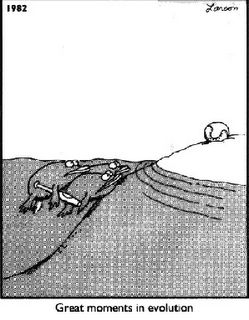Evolution, Pt.2: Our Fears

What seems to be fueling the war between educators/scientists and Christian conservatives here in Kansas is not simply disagreement, it is fear, and it is prevalent in both camps. Let's meet two people, one from each side, and see if we can't understand them a little better.
First, meet Mr. Jones. Mr. Jones is an evangelical Christian, and a young-earth creationist. He is the father of four, the oldest of which is in junior high (public school). He is afraid that what his son Joshua will hear in science class will contradict what he has been hearing at church and at home. No parent wants to be contradicted in front of their child. What kind of message does this send to Joshua? Who is he to believe? His parents & pastor, who tell him that the earth is only 6,000 years old and that the fossil record does not support evolution, or his science teacher, who tells quite a different story? Is it really the place of the public schools, and by implication, the government, to contradict what a child is taught at home? Surely you see the tension here.
Mr. Jones is also concerned that stirring up such confusion in a child will not only undermine parental respect, but faith as well. If Joshua is forced to choose between his Christianity (to which young-earth creationism seems inexorably linked) and modern science, he just might go for the latter, or he might even be thrown into a tail-spin of full-blown skepticism. To Mr Jones, teaching evolution in the classroom is the equivalent of a scene from the movie “Red Dawn” where American school children are being instructed by their new, communist teachers that there is no god, reinforced by a piece of candy. These associations are powerful, and if you can’t empathize with Mr. Jones’ fear, then you will never be able to communicate with him.
Next, meet Mrs. Smith. Mrs. Smith is an 8th grade science teacher at Famous President Jr. High. She graduated from State U. with a degree in Biology, and later earned her master’s degree in science education. She is an agnostic, but is not hostile to Christianity, having been raised in a good Catholic home. She is afraid that religious institutions are invading her classroom to say what she can and cannot teach. Doesn’t this sound a little like 1984 or the Taliban? She feels that when religious leaders and parents tell her how to do her job, it means that she isn’t competent or that she is somehow a bad person. She doesn’t want to undermine her student’s faith – she loves “her kids.”
Mrs. Smith is also afraid that if evolution is removed from the curriculum, it will degrade the quality of the children’s education. She is a scientist at heart, and she really believes that evolutionary theory is good science, and that these children shouldn’t be robbed of it. What if the school wasn’t allowed to teach cell theory, or planetary motion, or atomic theory? The idea of teaching creationism in school is troubling to her, since it necessarily involves teaching Judeo-Christian theology. How can we teach theology in a government-operated school, even if it is the “majority view?” What if the majority believed in a flat-earth or a geo-centric planetary system? Should we teach those? How should science curriculum be determined, if not by science?! If we really want to have a constructive dialogue, we must try to undertand her concerns and emotions.
Evolution: What Should I Believe?

I thought I'd start small and tackle evolution. It seems appropriate, given the raging debate here in Kansas. I have really struggled with how I, as an evangelical Christian, should view Darwin's brainchild. Should I embrace it as simply sound science? Or should I fight it tooth and nail as the bane of faith?
Allow me to frame the debate for my particular purposes. Firstly, purely naturalistic evolution is disqualified a priori. My belief in a personal God who routinely involves Himself in the affairs of His creation is not presently up for evaluation. Second, the struggle I am most interested in, and the one in which I find myself torn, is more of a civil war within the body of Christ. Evangelicals (theological conservatives) find themselves opposed to evolution en toto, while more "liberal" believers feel that the authority of scientific knowledge carries enough weight to warrant adjustments to traditional church views.
I have found little help from either side of the conflict. Most evangelicals are firmly entrenched with little or no real understanding of the scientific data. The debate isn't even open to them. Similarly, most "liberals" or "Christian" scientists (not talking about Mary Bake Eddy) balk at any suggestion that the scientific community could be in error. I am trapped between two dogmas, it would seem.
Aren't we truth seekers? Aren't we compelled to follow the evidence, no matter where it leads? While I do enjoy Kierkegaard's writing, the idea of the "leap of faith" is ultimately self-defeating. That apporach simply can't distinguish between legitimate faithfulness in the face of doubt, and stubborn mind-closing in the presence of recalcitrant data. No, we must weigh the evidence and use our God-given rationality. Of course, "evidence" (in the broader context)includes not only "scientific" data, but religious experience, revelation, reason, etc. All must be taken into account, each with their appropriate weight.
My fear is that those reading this will not come with open hearts and minds. They will see these comments as "enemy ideas" and will feel it appropriate to raise the epistemic drawbridge with all haste. I understand this reaction. All I can say is, "I come in peace."
The Argument Clinic

Before we dive into any juicy arguments here, let's sqaure away a few preliminaries. You have to enter this arena with the heart of a truth-seeker. "Arguments" aren't about egos, or politics, or even "defending the faith." Arguments are about finding the truth. An argument isn't an emotional battle using hurtful words. An argument, in the formal sense, is a group of statements containing premises and a conclusion in which the premises are given as support for the conclusion. Two people don't have an argument, they discuss an argument. An argument is not an event, it is a case for or against something.
Here are some tips for constructive arguing:
- Believe you may be wrong – the foundation of all helpful dialogues; don’t even bother without it
- Take the other person seriously – respect, seek to understand
- Watch out for emotions – yours and theirs (they may be speaking from emotions – don’t respond to that)
- Be a truth-seeker – are you honestly after truth, or just out to make your point?
- Do your homework – don’t just expect people to take your word for it; have some evidence or research to back it up
- Assertions vs. arguments – just saying “George Bush is a moron” is not an argument
- Know when to walk away – if you or they get too emotional or disrespectful
In a nutshell, HUMILITY. If we can agree to discuss issues with this kind of demeanor, then we can produce more light than heat.
Paddle Ball Spirituality

I had to post a photo of this. What do you think? Making the resurrection accessible to kids is commendable. Reducing the resurrection to a novelty toy is troubling.
In my mind, the negatives seem to outweigh the positives. The trivializing nature of the toy contributes to the steadily diminishing wonder of the resurrection in our culture. Hallmark, Cadbury, et al., have leveled the playing field and rendered all holidays equally banal. Similarly, I imagine that upon recieving her "Jesus Is Risen!" paddle toy, the spiritual benefit imparted to the child is quite miniscule.
Perhaps I am being too narrow minded. Maybe there is a profound spiritual symbolism in the paddle toy that draws us deeper into the mystery of the resurrection. Yes! Just as the ball snaps back every time you smack it, Jesus "bounces back" from the grave!
My inner cynic retorts, "You just know that somewhere in rural Arkansas there's a remote warehouse with boxes and boxes of "Merry Christmas," "Be My Valentine," and "National Pretzel Day" paddle games. It's nothing more than a chance to sell more worthless crap."
In any case, I suppose it could be seen as benign. I just don't want to find myself trivializing the crux of history.

